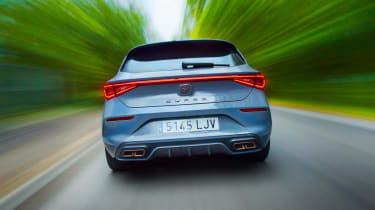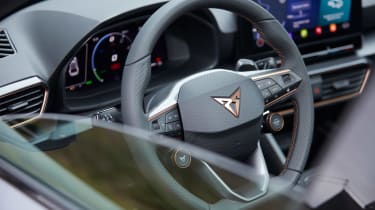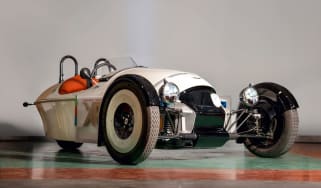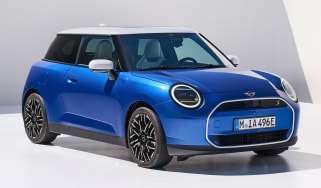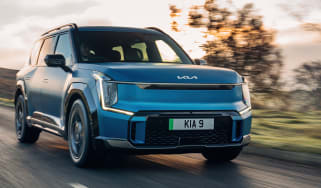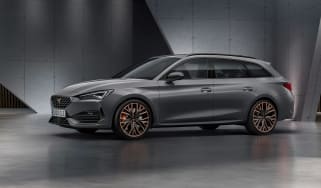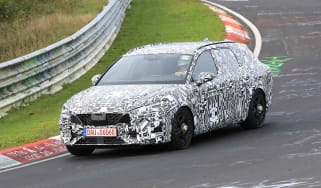Cupra Leon e-Hybrid review
Can Cupra create a successful plug-in hot hatch from the same ingredients that make up the VW Golf GTE?
Pros
- Smart looks
- Low running costs
- Powerful, with tidy handling
Cons
- Drivetrain can be hesitant
- Infotainment system not the best
- Driving experience compromised
| Car type | Electric range | Fuel economy | CO2 emissions |
|---|---|---|---|
| Plug-in hybrid | 34 miles | 217mpg | 30g/km |
Spanish brand Cupra's future is wholly concerned with fully electric cars like the Born family hatchback and the anticipated production version of the swoopy Tavascan SUV, but for the time being it still offers a range of purely combustion-engined and hybrid models, including this Cupra Leon e-Hybrid. It's a high-performance hatchback that shares much under the metal with the second-generation Volkswagen Golf GTE.
The VW aims to offer a 'best of both worlds' mix of excellent fuel economy and low running costs in everyday driving, combined with enough power and handling ability to satisfy keen drivers on a twisty country road or race-circuit trackday. In our opinion, it doesn't quite manage the latter, but if you're running one as a company car, the huge difference in your Benefit-in-Kind (BiK) bill compared to running a petrol Golf GTI may be impossible to ignore.
So does the same hold true for the Cupra Leon e-Hybrid? In short, yes. It has the same 1.4-litre petrol engine and electric motor combination as the Golf, delivering the same total power output of 242bhp through the same six-speed dual-clutch gearbox. Official CO2 emissions are 30g/km and the 12.8kWh battery is sufficient, according to Cupra, for a 34-mile range on electric power alone. Top speed is 140mph and accelerating from 0-62mph takes a swift – if not searingly quick – 6.7 seconds.
As is the case with the Golf, the Leon's near-1,600kg weight makes itself felt whenever you try to drive with any enthusiasm. The extra weight is of course down to the electric motor and battery pack, which are naturally only of use when charged up, so you should think long and hard about buying a Leon e-Hybrid if you don't have the facility to top up with electricity regularly at home or at your workplace.
The Leon e-Hybrid isn't a bad handling car by any means; in fact it's quite tidy and composed on most types of road, with nicely accurate steering. It's just that the weight blunts things slightly compared to the lighter (and more powerful) petrol-engined Cupra Leon. And the hybrid is also compromised by how its drivetrain behaves: performance cars sink or swim on how responsive they are to a prod of the accelerator pedal, and how swiftly they can take off in gear.
In these respects, the Leon suffers, because the petrol and electric elements sometimes feel like they're fighting each other rather than working in harmony: the electric motor on its own isn't powerful enough to deliver the kind of 'shove' you get from a pure-electric car, while the engine frequently takes too long to 'wake up' and join the party, resulting in an at-times hesitant and disjointed driving experience.
Plus, like nearly every plug-in hybrid, the Cupra's real-world electric range falls some way short of the manufacturer's number from official testing: in this case, it's more like 20 or 25 miles, not 34, depending on the outside temperature and your driving style. True, the on-paper number is what counts when it comes to calculating your company-car tax bill, but this reduced range also makes the claimed fuel-economy number impossible to hit, so savings on petrol may not be as extensive as you think.

The Cupra Leon e-Hybrid is a tough car to recommend, then. If you're looking for a cheap-to-run hot hatch, you'll find it doesn't quite deliver on the 'hot hatch' side of the bargain – the full-fat 300bhp petrol version is a much better bet in that respect. And if you simply want a practical, comfortable and smart-looking hatchback with decent handling and performance for everyday driving, the regular SEAT Leon e-Hybrid fits the bill much better.

